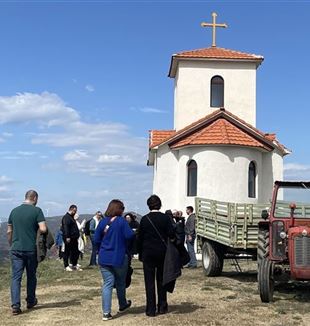
"That common thread that binds us"
From Bulgaria, Greece, Kosovo, Romania... The small communities of the movement from the Balkans gathered in Macedonia at the end of March for a vacation."They too are happy." Thus commented the 12-year-old daughter of a friend of ours from Kosovo during her vacation in Macedonia. And "macedonia" [fruit salad in Italian] is the best way to describe the diversity of nationalities and experiences that welcomed friends from Bulgaria, Greece, Kosovo, Macedonia, Romania – and a beautiful, impromptu online testimony from Turkey. These are small communities that live the encounter with Christ and the relationships that are born as something essential that shines through in the way we look at each other and listen to each other. We are the carnal witness that Christ is present and that faithfulness belongs to Another.
Ettore Pezzuto, international responsible of the movement, and Fr. Stefano Pasquero, who has been put in charge of following the Balkan CL communities, guided us during these three days to rediscover what the proposal of the movement is. What a sight to discover that our common thread – given the unfamiliarity as many had not been in attendance since 2019 – was enough to make us feel so close. The short trip up to the Shrine of Our Lady Consolata in Paljurska, where St. Paul is said to have passed by, was another opportunity to get to know each other better. The assembly, too, helped us open our hearts. There were those who spoke of the fruits that come from simply following Christ by loving the path of which he had put us; others spoke of how the Pope's provocation prompted them to recognize that the Church – that is, us – lives because Christ lives in it "here and now." A Polish friend of ours who lives in Greece, left us disarmed by saying, "I met you and experienced the happiness you were talking about. Now I can look at everything around me. Meeting you has awakened in me a sensitivity and a gaze that I did not think I had."
"They too are happy". This is the simple indication of those who see the factor that holds us together and allows us to live like this, and that it is not the sum of our abilities. And this is true even when we are talking about small realities, like the in Kosovo or the other in Athens... But then, how not to get lost? How to maintain this affection without a daily relationship, not even a coffee together?
Federica, connected from Turkey, where she lives today, told about this. She too, who has been in the movement for many years, found herself alone in a metropolis like Istanbul, and asked herself the question: "How does what I have met dialogue with what I am experiencing today?". The starting point, she added, is what is already there: small, different, sometimes not immediately corresponding, but there you put yourself at stake and start over from how Christ seized you. And you discover that in fact there is everything you need, that the relationship with your faith passes through your daily life.
Just like Federica, we too live in different and distant countries, so ow can we help each other, then, to live everyday life? Looking at each other, we see that we have all been called, as the Pope told us last October 15, not to lose "the fascination of the first encounter". Thus, the unity in our charism and the faces of those few (but good) friends are where we experience that essential embrace. That is, as Ettore told us, we share Christ and our unity is the gift of his Spirit. Fr. Stefano then reminded us how correspondence is not a feeling but a judgement, and this was an important point for all of us to take home.
Now we are looking wait to seeing each other again because we cannot follow Christ without of this path, these people, our movement. Ours is a "macedonia" of people who make God's invisible presence visible.
Paolo, Athens, Greece